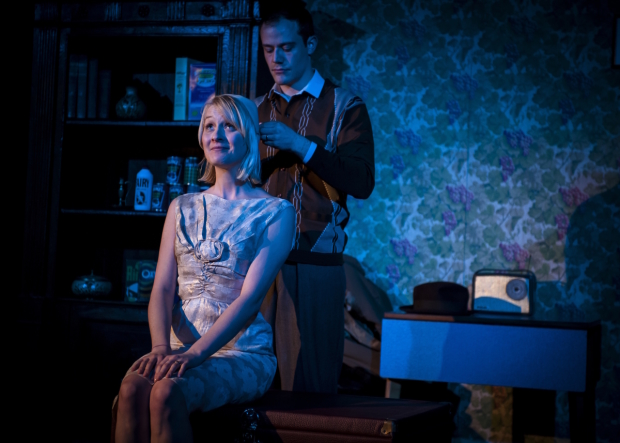One Hand Clapping
Anthony Burgess’ satirical novel of consumerism, greed, and faithless marriage comes to the stage at 59E59 Theaters.

(© Emma Phillipson)
Most who are familiar with Anthony Burgess associate him with his 1962 dystopian novel A Clockwork Orange — or at least with Stanley Kubrick's classic film adaptation of it. Fewer know about the book that Burgess published the year before, a more quietly chilling, though no less prescient, novel called One Hand Clapping. Lucia Cox directs a cast of three at 59E59 Theaters in her relatively faithful adaptation of Burgess satirical, cynical take on consumerism, greed, game-show culture, and human apathy. The production teases out Burgess' eerily prophetic story while adding a discomfiting feeling that we may have more in common with the play's odd characters than we care to admit.
As in the novel, Janet Shirley (a charmingly perky Eve Burley) narrates the story of her marriage to obsessive-compulsive car salesman Howard (engagingly played with stoic precision by Oliver Devoti) and their meteoric rise up the income ladder. Janet is more than happy living a simple life in London as a grocery clerk, with her evenings of tea and television. But Howard, a doomsday predictor with a photographic memory, wants them to have the best that money can buy. So he uses his special brain to win big on a TV quiz show, then figures out a way to predict horse races.
Flush with cash, Howard decides to subsidize the arts by hiring a poet, Redvers Glass (Adam Urey in a subtly humorous performance), to write a poem about the decay of England. Janet, however, finds herself falling for the poet and the two begin a secret affair. Shortly after, Howard and Janet set out on a spending spree in New York and other American cities, but on their return Janet discovers that her husband had an insidious reason for taking them on their trip of wild extravagance.
Cox has infused Burgess' tale of voracious consumerism and the madness behind it with humorous images of modern excess. The set and costumes (designed by Meriel Pym) exude a shabby Mad Men mystique, but with knowing winks to our present, such as four TVs in one room, all of which run old black-and-white commercials between the scenes. Owen Rafferty's sound and lighting create an eerie otherworldliness during those moments — televisions glowing in the dark and songs with nonsensical lyrics adding a note of absurdity to the increasingly disturbing story unfolding onstage.
One of the script's strengths is its frequent use of Burgess' language, which dazzles with its insights into the superficiality of human desires and pleasures. As Janet, Burley adds nuance to Burgess' words with her bubbly, energetic, happy-sales-clerk demeanor, which makes us suspect, in the end, that Janet may not be an entirely reliable narrator. If, as she says, Howard had a hidden agenda for his American vacation, does she, in fact, have one for telling her story? Burley makes Janet seem so emotionally detached from her actions, it's impossible not to wonder.
Questions like that make One Hand Clapping a provocative, if not always satisfying, theater experience. Though it's only 75 minutes long, the weight of that time is felt in some drawn-out scenes that were carried over from the book, like the blindingly boring quiz show. That said, by play's end, many hands are heard enthusiastically clapping.








